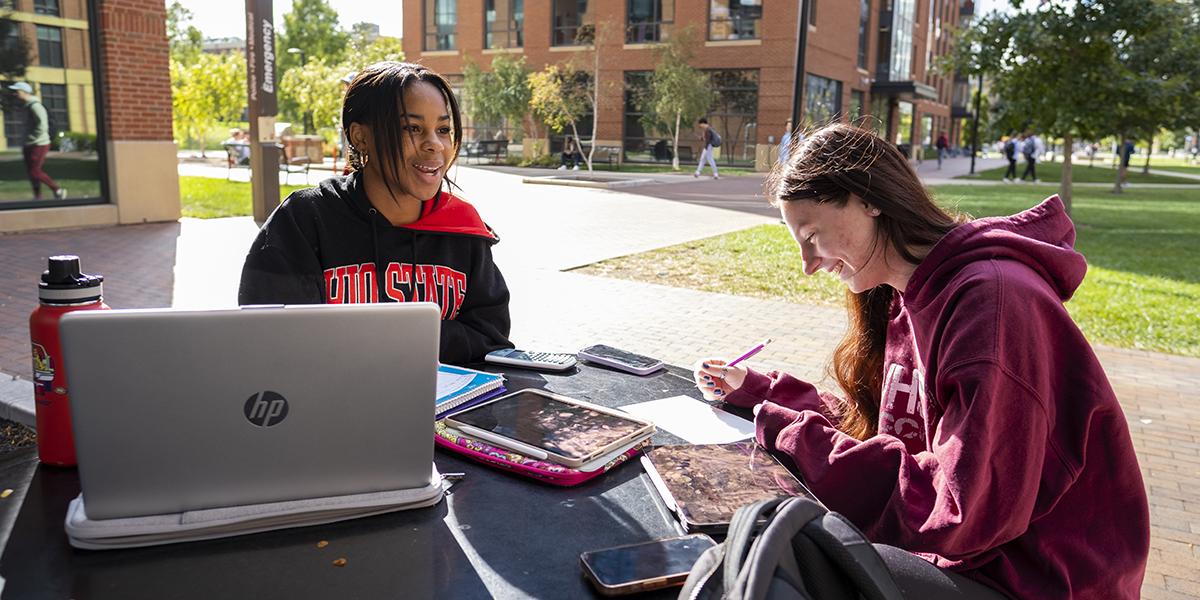During her first year at Ohio State, Morrill Scholar Olivia Tull found herself facing a difficult truth: I need help. Challenged by her chemistry courses and needing additional support, Tull turned to Academic Services within ODI's Scholarship and Supplemental Academic Services.
Open to Scholars from ten different ODI programs, Academic Services offers individualized tutoring in over fifty courses, supplemental group instruction for commonly difficult subjects, and study materials for over 100 classes.
For students who take advantage of them, these services come with a plethora of rewards: better grades, deeper understanding of course material, and higher self-esteem. But Tull argues it's not just students receiving support who benefit: For those who serve as peer educators, providing tutoring can be just as valuable.
Now a third-year health sciences major on the pre-med track, Tull has come full circle as a tutor for Academic Services, where she applies her unique perspective to teach students in similar circumstances.
“I know what it's like to be in their position, and I can share wisdom with other people and help them make meaning out of mistakes that I made previously,” said Tull, who tutors in chemistry and biology. “Seeing both sides has been super neat. I never thought I would be in the position of a tutor, only ever a tutee.”
Beyond just teaching subject matter, being a tutor requires students to develop a variety of skills , including leadership, problem solving, and responding to feedback. In a typical day, peer educators must create a plan to structure their sessions—and be prepared to abandon that plan if it doesn't meet a tutee's needs.
“Tutoring has helped me in listening and observing,” noted Yannick Lambe, a third-year neuroscience major, BNRC student, and math and psychology tutor. “You have to listen to what the tutee says are their struggles, be able to hear that, and be intentional about helping them in whatever they need. I think over the past year, I've grown a lot in that ability.”
While practical skills are important, tutoring also has personal and social benefits for peer educators. Third-year microbiology major and Morrill Scholar Shreaya Madireddy started tutoring to use her academic acuity to serve others, but she soon discovered her tutees were serving her, too.
“When I first started, I was a little timid, but during my first few tutoring sessions, people gave me comments like, ‘This has helped me so much,' and ‘I have gained so many good strategies.' That has boosted my confidence and self-esteem,” commented Madireddy, a chemistry and biology peer educator. “It also helps me connect with people that are in ODI programs. It's nice to see diverse groups of students, and I'm so grateful that tutoring has helped me bond with my ODI community.”
As the peer educators grow their confidence, so do the tutees—a factor that is often key to their success.
“My favorite part is being in the role of somebody who can encourage the student. Sometimes all you really need is encouragement,” Tull explained. “Yes, you need to work with the material sometimes, but it also really helps when you have someone on your side who cares about how you're doing in the class and can say, ‘You're going to do great.'”
She recommends all ODI Scholars look into Academic Services, especially those who are struggling. “ODI has these resources for you. They want you to succeed,” Tull said. “There's nothing wrong with asking for help.”
